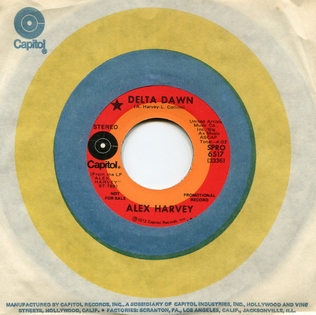
"Delta Dawn" is a song written by musician Larry Collins and country songwriter Alex Harvey. The first notable recording of the song was in 1971 by American singer and actress Bette Midler for her debut album The Divine Miss M. However it is best known as a 1972 top ten country hit for Tanya Tucker and a 1973 US number one hit for Helen Reddy.

Myrna Joy "Jody" Miller was an American singer, who had commercial success in the genres of country, folk and pop. She was the second female artist to win a country music accolade from the Grammy Awards, which came off the success of her 1965 song "Queen of the House". By blending multiple genres together, Miller's music was considered influential for other music artists.

"Another Lonely Night" is a song written by Jan Crutchfield and Larry Butler. It was released as a single by both Jean Shepard (1970) and Jody Miller (1977). Shepard's version was the highest-charting, rising into the top 20 of the US country chart in 1971. Her version was included on her 1971 studio album Here and Now. Miller's version also made the US country chart, but only rose into the top 80 after its release. Both versions were reviewed by Billboard magazine following their individual releases.

The discography of American singer Jody Miller contains 21 studio albums, five compilation albums, one video album, one album appearance, one extended play (EP) and 57 singles. Of her 57 singles, 47 were issued with Miller as the lead artist, two were released as a collaboration, two were promotional singles and five were internationally-released singles.

The singles discography of American country artist, George Jones, contains 182 singles. Of the total, 136 were released with Jones as the solo artist. In addition, 31 were issued with Jones being part of a collaboration. Thirdly, eight singles were issued with Jones being part of a featured act. Fourthly, seven released were promotional singles. Additionally, 14 songs that are not released as singles are included that made any major chart. Finally, 21 music videos which were first issued as singles are also listed. Jones had his first chart success in 1955 with several top ten Billboard Hot Country Songs singles: "Why Baby Why", "What Am I Worth" and "You Gotta Be My Baby". After several more top ten releases, "White Lightning" became his first to top the Billboard country chart. Along with "Who Shot Sam", both singles were also his first to make the Hot 100 charts.
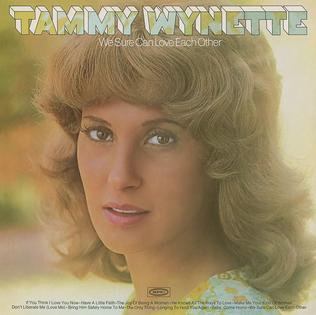
We Sure Can Love Each Other is a studio album by American country artist, Tammy Wynette. It was released on May 3, 1971 via Epic Records and was the eleventh studio album released in her career. The disc contained a total of 11 tracks, mixing new material with cover tunes. The title track was the only singles included and became a chart-topping country song in North America. The album itself also charted in the top ten of the American country albums chart and received positive reviews by critics.

"Good News" is a song originally recorded by American singer Jody Miller. It was composed by George Richey, Billy Sherrill and Norro Wilson. It was released as a single on Epic Records in 1973. It was among several singles by Miller to reach the top ten on the North American country music charts. It also served as the title track for Miller's 1973 album Good News!. It received a positive response from Cashbox magazine shortly after its release.

Melba Montgomery is a self-titled studio album by American country artist, Melba Montgomery. It was released in October 1973 via Elektra Records and contained 12 tracks. The disc was Montgomery's first with the Elektra label and eighteenth album overall. Material on the album mixed both uptempo numbers with ballads. New selections along with cover songs were included. The album included two singles. The first single, "Wrap Your Love Around Me", reached the top 40 of the American country songs chart in 1973. The album received positive reception from Billboard magazine following its release.
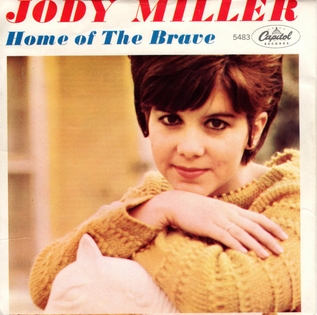
"Home of the Brave" is a song recorded and made successful by American singer Jody Miller. It was composed by songwriters Barry Mann and Cynthia Weil. Released as a single by Capitol Records in 1965, "Home of the Brave" reached the pop charts in the United States, Canada and Australia. It was characterized as a protest song for its discussion of social issues during the sixties decade. It was among Miller's most commercially successful recordings in her career despite being banned from radio stations. "Home of the Brave" was released on an album of the same name in 1965.

Look at Mine is a studio album by American singer Jody Miller. It was released in December 1970 via Epic Records and contained 11 tracks. It was the sixth studio album of Miller's career and her first to be marketed for the country music market. Its tracks were covers and new material. Two singles were featured on the disc: the title track and "If You Think I Love You Now ". The songs reached top 40 positions on the North American country charts. Look at Mine received a negative review from AllMusic.
"Look at Mine" is a song originally recorded by American singer Jody Miller. Composed by Tony Hatch and Jackie Trent, it was released as a single on Epic Records in 1970. It reached the top 40 on the North American country charts, setting forth a series of commercially successful singles for Miller in the country genre. It received a positive response from Cashbox magazine shortly after its release.
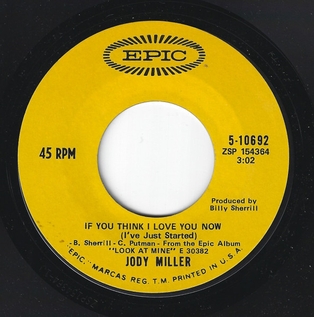
"If You Think I Love You Now (I've Just Started)" is a song originally recorded by American singer Jody Miller. Composed by Curly Putman and Billy Sherrill, it was released as a single on Epic Records in 1970. It reached the top 20 on the American country chart and the top 30 of the Canadian country chart. It received a positive response from Billboard magazine shortly after its release.
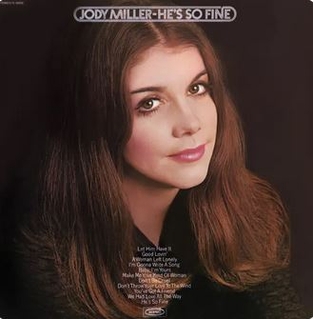
He's So Fine is a studio album by American singer Jody Miller. It was released in August 1971 via Epic Records and contained 11 tracks. A majority of the album's material were covers of country and pop songs. Two of its covers were originally released as singles: the title track and "Baby I'm Yours". Both reached the top ten of the North American country charts and reaches other chart positions. The album itself reached the top 20 of the American country chart in 1971.

"Let's All Go Down to the River" is a song originally recorded as a duet by American singers Jody Miller and Johnny Paycheck. The earliest known version of the song, titled "The Good Old Way," was published in Slave Songs of the United States in 1867. The song (#104) was contributed to that book by George H. Allan of Nashville, Tennessee, who was the transcriber, but the author was enslaved at that time and Alan did not record his or her name. It may have been arranged by Earl Montgomery and Sue Richards for the Miller-Paycheck recording, but they are absolutely not the authors of the song. The Miller-Paycheck rendition reached the top 20 of the American and Canadian country charts after being released as a single in 1972.
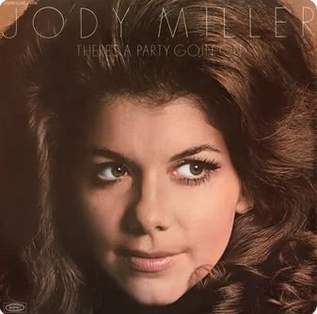
There's a Party Goin' On is a studio album by American singer Jody Miller. It was released in September 1972 via Epic Records and contained 11 tracks. The album blended country and pop songs. A series of popular country and pop cover recordings were included, along with some new material. There's a Party Goin' On reached the top 30 of the American country albums chart. A total of four singles were included on the album: "Be My Baby", "Let's All Go Down to the River", "There's a Party Goin' On" and "To Know Him is to Love Him". The title track was the most successful single from the album. The disc received positive reviews from publications following its release.

Good News! is a studio album by American singer Jody Miller. It was released in July 1973 on Epic Records and featured 11 tracks. The ninth studio album of her career, Good News! was a country-themed album mixing cover tunes with original material. Among its original songs were the singles "Good News" and "Darling, You Can Always Come Back Home". Both singles reached the top ten of the North American country charts in 1973. The album itself reached the top 20 on the American country chart in 1973. It was followed by a positive review from Billboard the same year.
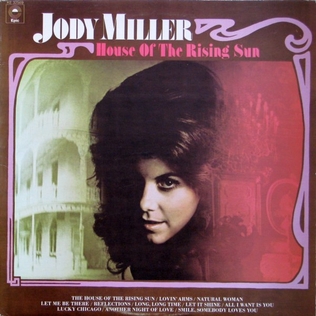
House of the Rising Sun is a studio album by American singer Jody Miller. It was released in January 1974 via Epic Records and contained 11 tracks. Marketed as a country album, its 11 songs mixed covers with original material. Among its covers was the title track, which was among the album's three charting singles. The album itself reached the American country chart in 1974. It received positive reviews from Billboard and Cashbox following its release.

Country Girl is a studio album by American singer Jody Miller. It was released in February 1975 via Epic Records and contained ten tracks of material. It was the eleventh studio album of Miller's career and was an album of country recordings. Among the recordings were two singles that reached the American country songs chart: the title track and "The Best in Me". Country Girl was met with favorable reviews from critics.
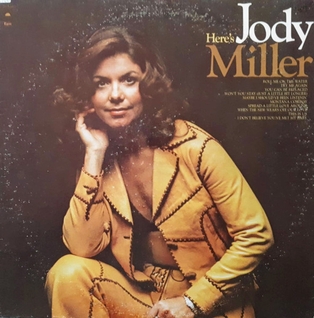
Here's Jody Miller is a studio album by American singer Jody Miller. It was released in March 1977 on Epic Records and featured ten tracks. The album included country material, two of which were singles. Its most successful was the top 25 American country chart record titled "When the New Wears Off Our Love". It was Miller's final album with the Epic label and her thirteenth album overall.
"When the New Wears Off Our Love" is a song written by Paul Craft that was originally recorded by American singer Jody Miller. It was released as a single on Epic Records in 1976. It was Miller's first top 40 entry on the American country music chart in three years and was her final to reach the top 40. It was later released on Miller's 1977 studio album Here's Jody Miller. The song was given positive reviews from publications following its release.


















